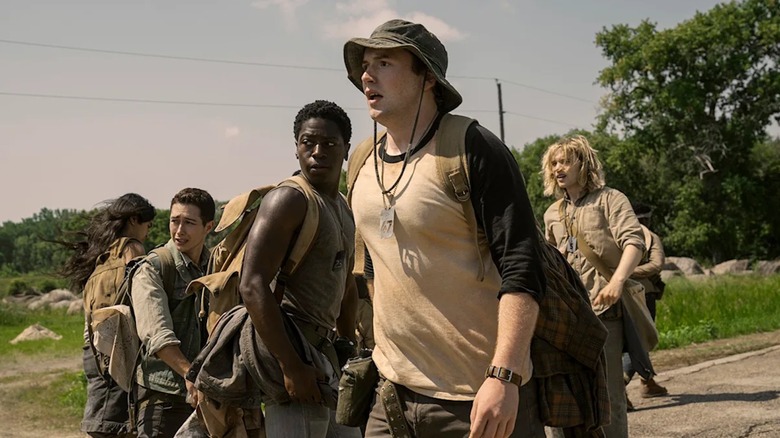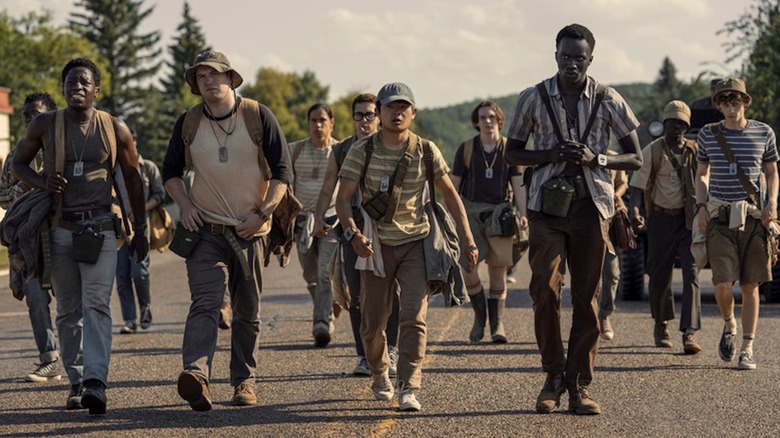Stephen King's The Long Walk Exists Thanks To This President's Plan For A Healthier America
Francis Lawrence's film adaptation of Stephen King's novel "The Long Walk" is set to trudge into theaters this Friday, and it's got the wind at its back, at least critically, with a current Tomatometer score of 95% fresh on Rotten Tomatoes. (/Film's BJ Colangelo has declared it an all-time great King adaptation.) We'll have to wait until Friday to see if moviegoers are down for the bleak tale about 100 young men getting drafted into a competition that forces each person to maintain a pace of at least three miles per hour. Should they drop below this pace three times, they will be shot dead. The event continues until there is one survivor, who can have whatever they want, whenever they want it, for the rest of their life.
It's a rough book, and it certainly sounds like Lawrence has done its story justice, but as the September 12 release date approaches, you might be wondering where King got the idea for this grim yarn. The answer: Former President John F. Kennedy.
Obviously, JFK never explicitly forced teenagers into such a gruelingly cruel competition. No, he just thrust them into a war that involved drafting men as young as 19 years old to be sent to the meat grinder known as the Vietnam War. It should not come as a surprise that King, who turned 19 as the conflict neared its bloody peak, envisioned "The Long Walk" as, in part, a metaphor for this pointless war when he began writing it. The book, which was published under his nom de plume Richard Bachman in 1979, arrived four years after the end of the war, but it has continued to resonate for readers young and old alike because Americans love war (especially when they're too old to serve).
King, however, drew his primary inspiration for "The Long Walk" from a very real and arguably good thing championed by JFK. This was called a "Kennedy march," and it was spawned by the President's concern that Americans were becoming slothful due to sedentary pursuits. In his executive order announcing the 50-mile hike program, Kennedy wrote, "The television set, the movies, and the myriad conveniences and distractions of modern life all lure our young people away from the strenuous physical activity that is the basis of fitness in youth and in later life." In other words, Kennedy hated indoor kids.
How did a Kennedy march work, and did King himself ever take a crack at it?
A young Stephen King did his own long walk
Kennedy got the idea for these marches from President Theodore Roosevelt, who once challenged U.S. Marines to hike 50 miles in 20 hours over no more than three days. Though the President's Council on Physical Fitness and Sports declined to fully endorse the marches (they just asked that people basically get out and walk every day), Kennedy was so popular with Baby Boomers that many young people took their President up on his challenge.
King, whose adoration of JFK prompted him to write his finest novel to date ("11/22/63"), was one of these people. Per King on his official website's entry for "The Long Walk," "I had that in mind. I didn't have a car when I wrote that book. I was hitchhiking everywhere. I didn't finish my 50-mile hike, though. I fell out after 20 miles."
Fair enough! A lot of people pulled up short of the goal — but not JFK's younger brother, Robert F. Kennedy, whose completion of a march was cited as a symbol of a healthy White House. The marches eventually fell out of fashion with the public. Our current President doesn't seem to give a rip about physical fitness, but given that his advisors have floated the possibility of making immigrants compete physically for legal status in the United States, we could very well be speeding toward something akin to "The Long Walk." Here's hoping moviegoers recognize this when they see Lawrence's movie in the coming weeks.
"The Long Walk" hits theaters on September 12, 2025.

